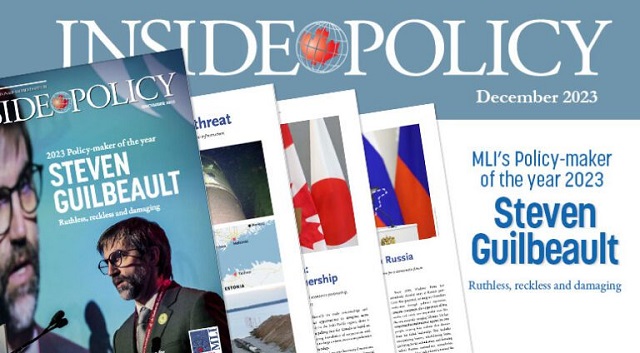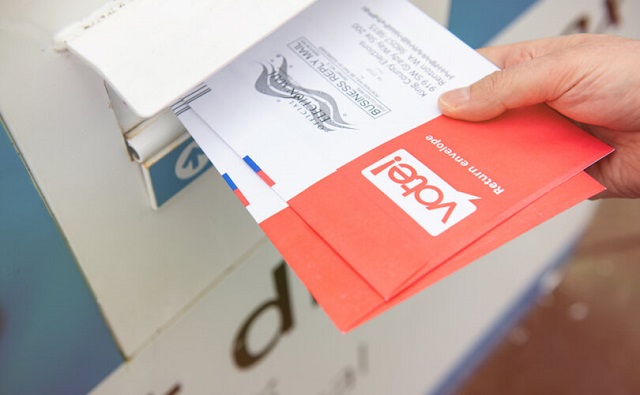Economy
Ruthless, reckless, damaging: the Hon. Steven Guilbeault is MLI’s Policy-maker of the year

From the MacDonald Laurier Institute
Guilbeault has treated the fact that Canada is a democracy, a market economy, and a federation as inconveniences to be overcome.
The Liberals have been chided for focusing on communications over substance, for announcing policies rather than implementing them. But there is an exception to this rule: the ruthlessly efficient Environment Minister Steven Guilbeault. No one else in Canada has been as influential, and, in my view, no one else has done so much damage.
From an emissions cap to toxic plastic straws, and from Clean Electricity Regulations to the Clean Fuel Standard, Guilbeault has been advancing economy-killing and constitution-defying laws at a frenzied pace.
He was appointed Minister of Environment and Climate Change Canada in October 2021. At the time of his appointment, Guilbeault appeared as the perfect villain: a caricature of the West-hating, anti-oil Liberal that has confounded the aspirations of Canadians west of the Laurentian corridor for decades. In the last two years he has disappointed few of his supporters and assuaged none of his critics’ fears.
Dubbed the “Green Jesus of Montreal” by La Presse, the 2001 image of Guilbeault being walked off in handcuffs in his faux orange prison jumpsuit emblazoned with the Greenpeace logo, following a CN Tower-scaling stunt to bring attention to climate change, features frequently in the social media accounts of his more outspoken critics.
The Canadian oil and gas sector has had a rough decade – from the shale revolution that flooded North America with cheap oil, to the COVID-19 pandemic – but it persisted. The sector achieved record breaking production, and royalties for governments, last year. The coming-into-service of TMX and CGL pipelines promises to grant additional export capacity for Canadian hydrocarbons.
But, like the final boss of a video game, Guilbeault is proving to be a formidable challenger to the country’s most important economic sector, even as the country struggles under declining productivity, persistent inflation and an affordability crisis. What Texas, Putin and OPEC could not undermine, Guilbeault is poised to do. This is intended as criticism but I expect Guilbeault would be pleased with the acknowledgment.
In this year alone he has advanced four sector-destroying policies, as part of the federal government’s much derided “pancake” approach to climate policy: stacking increasingly suffocating and incompatible regulations on Canadian industry to meet our Paris Accord commitments.
Carbon pricing schemes have broadly been accepted within heavy industry across Canada, if grudgingly. But with voters unwilling to accept a price per tonne of GHGs high enough to meaningfully address emissions, the Government has had to resort to additional, bespoke, mechanisms.
The Clean Fuel Regulations (CFR) came into effect on July 1, mandating reductions in the carbon intensity of transportation fuels through various methods, such as blending in biofuels. The Parliamentary Budget Officer found that the CFR are broadly regressive, impacting poorer households the most. The four Atlantic Premiers in particular contested the CFR on the grounds they would disproportionately hurt their residents, calling them “unfair and offensive to Atlantic Canadians” and demanding they be delayed. But Guilbeault blamed any price increase on refiners rather than his regulations, saying “there is simply no reason that they need to push costs onto consumers.”
While imploring refiners to decarbonize their product at a loss, Guilbeault also tacked on a ZEV (zero emissions vehicle) mandate to ensure any investments made in clean fuels today would have an ever-shrinking market and timeline to recoup costs. In other words, Guilbeault is asking refiners to invest in cleaner fuels while promising to ban their products before they could make back their money. The final regulations, mandating a 100 percent zero-emission vehicles sales target by 2035, were announced on December 19.
Such a move requires dramatically more capacity in the country’s electricity grid, up to 25% by some estimates. But, unbothered by the laws of physics, Guilbeault went ahead and introduced draft Clean Electricity Regulations (CER) in August. The CER will impose obligations on electricity generation to achieve net zero emissions in the grid by 2035 and will necessarily take large swathes of Canada’s existing generation capacity offline. In practice this means a phase out of coal, which is happening; and natural gas, which cannot realistically happen – particularly in the cold Prairie provinces of Alberta and Saskatchewan where hydroelectric generating capacity is limited, nuclear is years away, and intermittent wind and solar are unsuitable. The CER prompted Alberta Premier Danielle Smith to launch a national ad campaign protesting that “No one wants to freeze in the dark”.
More sober western voices have also warned against the CER. The CEO of SaskPower sent a letter arguing that while the utility was “on track to meet our commitment to reduce GHG emissions by 50 per cent below 2005 levels by 2030”, the CER are “not possible from technological, financial and logistical perspectives.” But Guilbeault has remained adamant that there will be no special carve outs for any province.
The crowning achievement of Guilbeault’s economy-destroying climate policies was announced on December 7: an emissions cap, and cut, on one sector only, Canadian oil and gas. The announcement was not made in downtown Calgary, amongst those most affected, but in Dubai at COP28. Such a cap is counterproductive, expensive, and both economically and politically self-sabotaging. There is no limit to the punishment Guilbeault is willing to impose on the energy sector, regardless of the collateral damage to the rest of the Canadian economy.
Guilbeault’s accomplishments do not end at stymying Canada’s upstream and downstream oil and gas sector. It’s been a fractious time for federal-provincial relations, and a challenging one for the Canadian Constitution. On a list that included Danielle’s Smith’s Alberta Sovereignty Act and Scot Moe’s Saskatchewan First Act; and invocations by Ontario, Quebec, and Saskatchewan of the notwithstanding clause; it was not one, but two of Minister Guilbeault’s laws that were declared unconstitutional by Canadian courts this year.
In the first instance, the Supreme Court of Canada determined the Impact Assessment Act – previously known as Bill C-69, or the No More Pipelines Act – to reach far beyond federal jurisdiction, granting Parliament “a practically untrammeled power to regulate projects qua projects, regardless of whether Parliament has jurisdiction to regulate a given physical activity in its entirety.” The vast majority of sections within the IAA were deemed unconstitutional.
Guilbeault doubled down, saying that the federal government would “course correct”, but that it would be unlikely to change the outcome of the IAA process for projects.
Just one month later, the Federal Court of Canada held that the federal government’s labelling of all Plastic Manufactured Items (PMI) as toxic was both unreasonable and unconstitutional. Again, Guilbeault was undeterred, and announced on December 8 that the federal government would appeal it.
It appears that, in Guilbeault’s view, federalism is an inconvenient and unacceptable barrier to accomplishing meaningful progress on climate change. For an ideologue like Guilbeault, the Constitution was not designed for, and is not up to the task of, addressing the existential threat posed by fossil fuels. But that is no reason not to try. He will continue to seek new avenues to restrain industry and the provinces; he will just have to tighten up the language.
No amount of tweaking will prevent the Clean Electricity Regulations and oil & gas emissions cap from facing challenges from Alberta and Saskatchewan. The federal government will rely on its criminal law power to see them through. He has suggested that violating the Clean Electricity Regulations, for example running coal fired plants beyond 2030, would be an offense under the Criminal Code. The joke in the Prairies is that he wants his western counterparts to have orange jumpsuits that match his own.
Guilbeault is seen as a true believer. His mission is to save the planet from climate change, and to save oil and gas producing apostates from themselves. Nothing will persuade him he should moderate his efforts. But I would be remiss not to point out that Guilbeault has shown the ability to tolerate pragmatism in his own Cabinet.
The first instance was with nuclear energy. Long a lightning rod for 20th century environmentalists, Guilbeault has historically been opposed to nuclear. In the Liberals’ Green Bond Framework, released in March 2022, nuclear energy was excluded alongside sin industries like tobacco & alcohol sales, arms manufacturing, gambling, and fossil fuels. After public opinion evolved, and in the face of successful nuclear refurbishments and new reactor developments in the GTA, the Liberal government reversed its decision. Guilbeault duly ate his humble pie, saying in April 2023 that:
“In the past I haven’t been the person who supported the most the development of nuclear energy. But when you look at what international experts like the International Energy Agency or the IPCC is saying, they’re saying, to prevent global temperatures from reaching 1.5 degrees Celsius, to achieve our carbon neutrality targets, we need this technology.”
This could not have been easy, and I applaud him for evolving his views in line with the evidence.
But he was not convinced enough to directly advocate for nuclear technology at COP28. On December 2, 2023 in Dubai, 22 states including Canada signed a landmark declaration committing to triple nuclear energy by 2050. Minister Guilbeault seemed to be everywhere at COP28; but he was not there for that announcement, missing the traditional ‘family photo’ of world leaders signing the nuclear declaration.
Likewise, Guilbeault had to accept with great reluctance the Liberals’ political gambit of exempting heating oil from carbon pricing. Their coalition must combine urban environmentalists and Atlantic Canadian townsfolk to win the next election. In the case of heating oil, the Atlantic caucus carried the day. But Guilbeault made clear it was a ploy not to be repeated, telling the Canadian Press in an interview on November 6th that he would not stand for any further concessions:
“As long as I’m the environment minister, there will be no more exemptions to carbon pricing…It’s certainly not ideal that we did it and in a perfect world we would not have to do that, but unfortunately we don’t live in a perfect world.”
Guilbeault is a threat to Canada’s prosperity, and to our allies’ too. Germany, Japan, Korea and others have come asking for more energy exports, only to be told there was no business case. The federal government’s own policies are making it so.
But more to the point his climate policies, committed though they may be, are destined to fail.
It is often said that if you want to go fast, go alone; but if you want to go far, go together.
Guilbeault is very far ahead from industry, the provinces, Canadians, and increasingly his own caucus. He is alienating voters who are concerned more about affordability and housing. There will likely be a backlash. As far as Guilbeault has swung the pendulum to the left, it will come swinging back at him and the Liberals the other way. The energy transition is a marathon, and Guilbeault is a sprinter.
One could almost admire Guilbeault’s unwavering commitment to his principles – his willingness to advance his goals in the face of criticism, resistance and alarm. But through his actions, Guilbeault has treated the fact that Canada is a democracy, a market economy, and a federation as inconveniences to be overcome.
Canadians that care about these things will find many reasons to be concerned with Guilbeault’s efforts this year. His impact on the nation’s politics and economy will be felt long after his policies have been overturned.
Heather Exner-Pirot is the director of energy, natural resources, and environment at the Macdonald-Laurier Institute.
CBDC Central Bank Digital Currency
A Fed-Controlled Digital Dollar Could Mean The End Of Freedom

 From the Daily Caller News Foundation
From the Daily Caller News Foundation
Central bank digital currencies (CBDC) are a threat to liberty.
Sixty-eight countries, including communist China, are exploring the possibility of issuing a CBDC. CBDCs are essentially government-sponsored cryptocurrencies pegged to the value of a national currency that allow for real-time payments.
The European Union has a digital euro CBDC pilot program, and all BRICS nations (Brazil, Russia, India, China and South Africa) are working to stand up CBDCs. China’s CBDC pilot, the largest in the world, is being used by 260 million individuals.
While faster payments are a positive for markets and economic growth, CBDCs present major risks. They would allow governments to meticulously monitor transactions made by their citizens, and CBDCs open the door for government planners to limit the types of transactions made.
Power corrupts, and no government should have that level of control. No wonder China and other authoritarian regimes around the globe are eager to implement a CBDC.
Governments that issue CBDCs could prohibit the sale or purchase of certain goods or services and more easily freeze and seize assets. But that would never happen in the U.S, right? Don’t be so certain.
Take a look at recent events in our neighbor to the north. The government of Canada shut down bank accounts and froze assets of Canadian citizens protesting the COVID-19 vaccination in Ottawa during the winter of 2022. With a CBDC, authoritarian actions of this kind would be even easier to execute.
To make matters worse, the issuance of a CBDC by the Federal Reserve, the U.S.’s central bank, has the potential to undermine the existing banking system. The exact ramifications of what a CBDC would mean to the banking sector are unclear, but such a development could position the Fed to offer banking services directly to American businesses and citizens, undercutting the community banks, credit unions, and other financial institutions that currently serve main street effectively.
The Fed needs to stay out of the banking business – it’s having a hard enough time achieving its core mission of getting inflation under control. A CBDC would open the door for the Fed to compete with the private sector, undercutting economic growth, innovation, and financial access in the process.
Fed Chair Jerome Powell has testified before Congress that America’s central bank would not issue a CBDC without express approval from Congress, but the Fed has studied CBDCs extensively.
For consumers who want the ability to make real-time payments internationally, CBDCs are not the answer. Stablecoins offer a commonsense private sector solution to this market demand.
Stablecoins are a type of cryptocurrency pegged to the value of a certain asset, such as the U.S. dollar. If Congress gets its act together and creates a regulatory framework for stablecoins, many banks, cryptocurrency firms, and other innovative private sector entities would issue dollar-pegged stablecoins. These financial instruments would allow for instantaneous cross-border payments for market participants who find that service of value.
Stablecoins are the free market response to CBDCs. They offer the benefits associated with the technology without the privacy risk, and they would likely enhance, not disrupt, the existing banking sector.
Representatives Patrick McHenry (R-N.C.) and French Hill (R-Ark.) have done yeoman’s work advancing quality, commonsense stablecoin legislation in the House of Representatives, and the Senate needs to move forward on this issue.
Inaction by Congress will force innovators overseas and put the U.S. at a competitive disadvantage. It would also help the Fed boost the case for a CBDC that will undermine liberty and open the door to government oppression.
Tommy Tuberville is a Republican from Alabama serving in the United States Senate. He is a member of the Senate Agriculture Committee, which plays a key role in overseeing emerging digital assets markets.
Business
Taxpayers criticize Trudeau and Ford for Honda deal

From the Canadian Taxpayers Federation
Author: Jay Goldberg
The Canadian Taxpayers Federation is criticizing the Trudeau and Ford governments to for giving $5 billion to the Honda Motor Company.
“The Trudeau and Ford governments are giving billions to yet another multinational corporation and leaving middle-class Canadians to pay for it,” said Jay Goldberg, CTF Ontario Director. “Prime Minister Justin Trudeau is sending small businesses bigger a bill with his capital gains tax hike and now he’s handing out billions more in corporate welfare to a huge multinational.
“This announcement is fundamentally unfair to taxpayers.”
The Trudeau government is giving Honda $2.5 billion. The Ford government announced an additional $2.5 billion subsidies for Honda.
The federal and provincial governments claim this new deal will create 1,000 new jobs, according to media reports. Even if that’s true, the handout will cost taxpayers $5 million per job. And according to Globe and Mail investigation, the government doesn’t even have a proper process in place to track whether promised jobs are actually created.
The Parliamentary Budget Officer has also called into question the government’s claims when it made similar multi-billion-dollar handouts to other multinational corporations.
“The break-even timeline for the $28.2 billion in production subsidies announced for Stellantis-LGES and Volkswagen is estimated to be 20 years, significantly longer than the government’s estimate of a payback within five years for Volkswagen,” wrote the Parliamentary Budget Officer said.
“If politicians want to grow the economy, they should cut taxes and red tape and cancel the corporate welfare,” said Franco Terrazzano, CTF Federal Director. “Just days ago, Trudeau said he wants the rich to pay more, so he should make rich multinational corporations pay for their own factories.”
-

 espionage1 day ago
espionage1 day agoOne in five mail-in voters admitted to committing voter fraud during 2020 election: Rasmussen poll
-

 Business1 day ago
Business1 day agoHonda deal latest episode of corporate welfare in Ontario
-

 Automotive1 day ago
Automotive1 day agoThe EV ‘Bloodbath’ Arrives Early
-

 Frontier Centre for Public Policy14 hours ago
Frontier Centre for Public Policy14 hours agoHow much do today’s immigrants help Canada?
-

 CBDC Central Bank Digital Currency19 hours ago
CBDC Central Bank Digital Currency19 hours agoA Fed-Controlled Digital Dollar Could Mean The End Of Freedom
-

 Brownstone Institute18 hours ago
Brownstone Institute18 hours agoThe Numbers Favour Our Side









